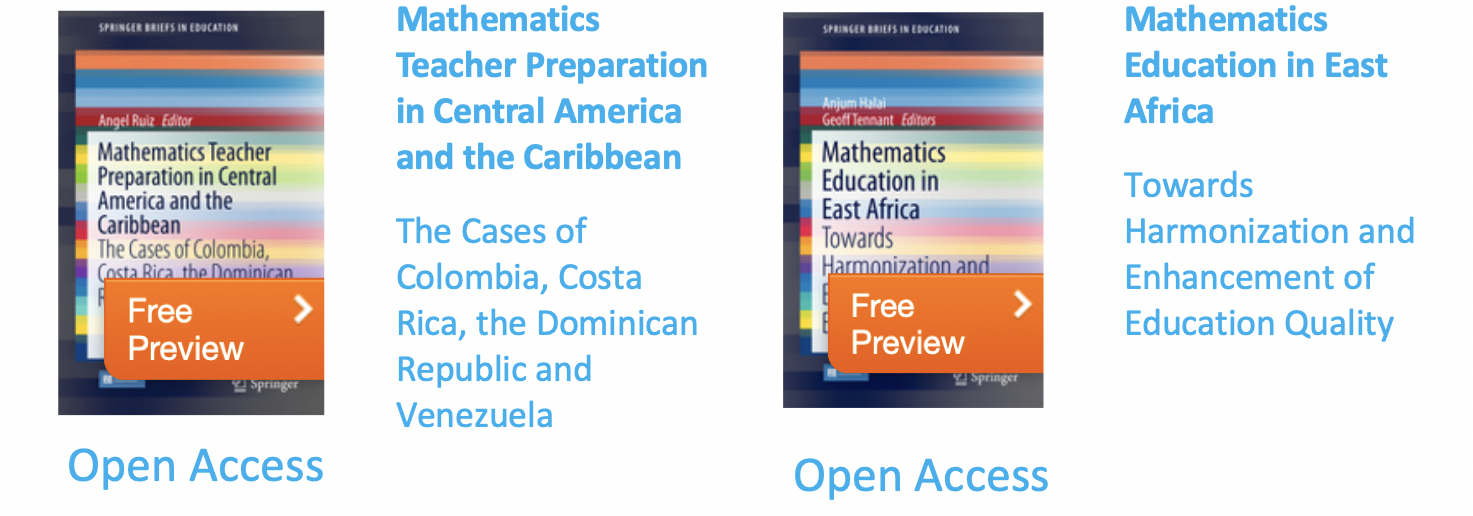CANP is a major development focus of the international bodies of mathematicians (IMU) and mathematics educators (ICMI). It consists of an ongoing series of Programs in different developing regions. CANP aims to develop the educational capacity of those responsible for mathematics teachers, and create sustained and effective regional networks of teachers, mathematics educators and mathematicians, also linking them to international support.
The two publications which are now available open access are results of the programs which started 2012 in Central America and the Caribbean and in 2014 in East Africa.
"Mathematics Teacher Preparation in Central America and the Caribbean" is an synthesis of the initial and continuing preparation for Mathematics Teaching in Colombia, Costa Rica, Dominican Republic and Venezuela, from which comparative analyses can be made that show similarities and differences, and highlight various perspectives.
In August 2012, a workshop of the Capacity and Networking Project (CANP) of the International Commission on Mathematical Instruction (ICMI) was held in Costa Rica. This CANP brought together for two weeks a group of 66 Mathematics educators, mathematicians, university administrators, and elementary and secondary teachers from Colombia, Venezuela, the Dominican Republic, Panamá and Costa Rica. The goal was to promote progress in Mathematics Education in the region; as such it was a unique experience in the region. One of the most important results of this event was the creation of the Mathematics Education Network of Central America and the Caribbean (REDUMATE). It was organized by persons associated with the Mathematics Education Reform Project in Costa Rica (responsible for the most outstanding and innovative curriculum reform in Latin America) and the Inter-American Committee on Mathematics Education (IACME), which is an official regional multinational organization affiliate of ICMI.
This book brings to the international Educational Community an important collection of experiences and ideas in the Mathematics Education of four countries of a region within the heart of the American continent, a region that has been many times forgotten. The dissemination of these results can promote the search for international collaborative actions in a wider scale. (see About this book here.)
Mathematics Education in East Africa Towards Harmonization and Enhancement of Education Quality is a valuable resource for policymakers and practitioners as it brings insights mainly from developing countries where relatively less research activity takes place. It is also a valuable resource for courses in mathematics education in the teacher education colleges, and departments of education in the sub-Saharan Africa region.
In the increasingly global and technological world mathematics is seen as a significant gatekeeper of opportunities for social and economic advancement and mobility. Hence, countries and development agencies in the broader sub-Saharan Africa region are looking towards increasing access to relevant and high-quality secondary education as a lever towards economic development. Policy makers and other key decision makers in education look towards improvement in mathematics teaching and learning as a key focus in education reform. In the East Africa region also a number of initiatives have been taken at the national level in the respective countries to improve the quality of mathematics education. This book provides an in-depth comparative analysis of the developments and issues in mathematics education in Kenya, Tanzania, Rwanda and Uganda, and advances our understanding of the state of secondary mathematics education in East Africa. (see About this book here).
